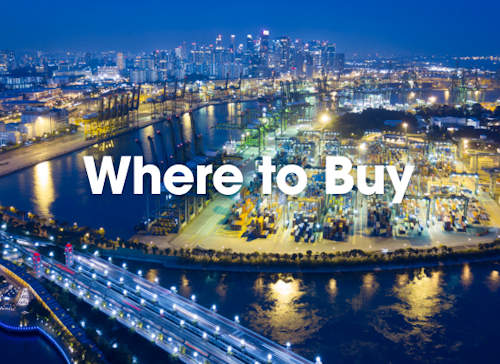
Purchasing a used maritime ship, whether it’s a cargo vessel, RoRo, tanker, or other types, involves numerous considerations such as local regulations, market conditions, and currency exchange rates. Here we’ll explore some of the top ports around the world renowned for their availability and favorable conditions for buying used ships.
1. Port of Singapore
Overview: The Port of Singapore is one of the busiest and most sophisticated ports in the world, making it a hub for ship trading. Its strategic location at the crossroads of major international shipping routes makes it a prime spot for buying used ships.
Regulations: Singapore has a robust regulatory framework governed by the Maritime and Port Authority of Singapore (MPA), ensuring that all transactions meet high safety and environmental standards.
Market Considerations: The market here is vibrant with a wide availability of various types of ships. Buyers can find numerous brokers and agents specialized in the sale of maritime vessels.
Currency: Transactions are typically conducted in Singapore Dollars (SGD) or US Dollars (USD), providing flexibility for international transactions.
2. Port of Rotterdam, Netherlands
Overview: As the largest port in Europe, Rotterdam serves as a major logistics and economic hub, offering a wide range of maritime services including ship brokerage.
Regulations: The port operates under the European Union regulations which are quite stringent, focusing heavily on environmental sustainability and safety.
Market Considerations: The port’s extensive network and its reputation for being a high-quality service provider attract sellers from across the globe, offering potential buyers a diverse range of used ships.
Currency: Transactions in Rotterdam are generally conducted in Euros (EUR), which is convenient for buyers from the EU and other countries.
3. Port of Hamburg, Germany
Overview: The Port of Hamburg, known as “Germany’s Gateway to the World,” is one of the busiest ports in Europe and a key location for maritime commerce, including the sale and purchase of used ships.
Regulations: Operating under strict German and EU regulations, the Port of Hamburg ensures that all ships sold and bought meet rigorous safety and environmental standards. This provides a high level of security for buyers.
Market Considerations: With its extensive trade connections and a well-established maritime infrastructure, Hamburg offers a reliable market for buying various types of used maritime vessels. The presence of many shipping companies and maritime brokers facilitates access to a wide range of potential ship purchases.
Currency: Transactions typically occur in Euros (EUR), making it straightforward for European buyers and other international purchasers familiar with this currency.
4. Port of Dubai, UAE
Overview: The Port of Jebel Ali in Dubai is the largest port in the Middle East and a significant player in global shipping. Its strategic location and free trade zones make it an attractive spot for buying used ships.
Regulations: Dubai’s maritime activities are regulated under the UAE’s federal laws and local emirate-level directives, which focus on business friendliness and strategic trade practices. The regulations here are less stringent compared to European ports, offering more flexibility in transactions.
Market Considerations: The port is known for its robust trade in various commercial vessels and offers significant advantages like tax exemptions and business incentives, particularly in free zones like Jebel Ali.
Currency: The UAE Dirham (AED), pegged to the US Dollar (USD), provides stability in transactions, beneficial for international deals.
5. Port of Shanghai, China
Overview: As one of the world’s busiest ports, the Port of Shanghai serves as a major hub for maritime trade in Asia. Its extensive facilities and strategic location make it an excellent place for buying used ships.
Regulations: China’s maritime regulations ensure that all ship transactions meet specific safety and environmental standards. The Shanghai Maritime Safety Administration provides oversight, ensuring compliance with both national and international shipping regulations.
Market Considerations: The Port of Shanghai’s vibrant trade volume and access to a vast range of shipping services and logistics support make it a prime market for various types of used vessels, from bulk carriers to container ships and tankers.
Currency: Transactions are usually conducted in Renminbi (RMB), which might require currency conversion for international buyers, but facilitates easier transactions within the local and regional markets.
6. Port of Hong Kong
Overview: Known for its deep natural harbor and extensive shipping facilities, the Port of Hong Kong is a significant global shipping hub. The port facilitates an active market for the purchase and sale of used ships.
Regulations: Hong Kong adheres to stringent international maritime regulations, with a well-established legal framework that ensures transparency and security in ship sales.
Market Considerations: The port’s robust shipping registry and the presence of numerous shipbrokers and maritime businesses provide buyers with a wide selection of used ships. Hong Kong’s status as a free port with no customs tariff and its non-restrictive port policy further enhance its attractiveness to international buyers.
Currency: Transactions in Hong Kong are typically handled in Hong Kong Dollars (HKD), which is freely convertible and widely traded, making financial transactions straightforward for global traders.
7. Port of Los Angeles, USA
Overview: The Port of Los Angeles, one of the largest ports in the United States, is a key gateway for international trade and a major hub for maritime activities, including the sale of used ships.
Regulations: Operating under U.S. federal law and specific California maritime regulations, the Port of Los Angeles ensures all transactions meet rigorous environmental and safety standards, making it a reliable market for purchasing used vessels.
Market Considerations: The port’s extensive network and strong ties with the Pacific and global shipping routes provide access to a diverse range of used maritime vessels. The presence of numerous maritime businesses and brokers enhances the availability and variety of ships for sale.
Currency: Transactions are typically conducted in U.S. Dollars (USD), offering straightforward financial dealings for both domestic and international buyers.
8. Port of Antwerp, Belgium
Overview: As the second-largest port in Europe, the Port of Antwerp is a significant player in the European shipping industry, known for its vast offerings in logistics and shipping services, including the trading of used ships.
Regulations: The port operates under strict European Union and Belgian maritime regulations, ensuring high standards for safety and environmental compliance in all shipping transactions.
Market Considerations: Known for its robust logistics capabilities, the Port of Antwerp provides potential buyers with access to a wide array of used ships, supported by expert maritime agents and brokers. The port’s strategic location also facilitates easy access to major European shipping lanes.
Currency: Transactions in the Port of Antwerp are generally conducted in Euros (EUR), facilitating easy and efficient financial transactions across Europe and beyond.
9. Port of Busan, South Korea
Overview: The Port of Busan, the largest port in South Korea and the fifth busiest container port in the world, is a crucial maritime hub in East Asia. Its advanced infrastructure and strategic location make it an ideal place for buying used ships.
Regulations: South Korea has stringent maritime regulations overseen by the Korean Maritime Safety Tribunal. These regulations ensure that all ships, including used ones, meet safety and environmental standards before being sold.
Market Considerations: Busan’s vibrant maritime economy and its role as a central hub in Asian maritime trade mean buyers have access to a wide selection of used ships. The presence of numerous shipyards and maritime businesses in and around Busan further boosts its market for used vessels.
Currency: Transactions are usually conducted in South Korean Won (KRW), which may require currency exchange arrangements for international transactions, but facilitates local and regional trades effectively.
10. Port of Piraeus, Greece
Overview: The Port of Piraeus is one of the oldest and largest ports in the Mediterranean and serves as Greece’s main port. It has seen significant investments and developments, making it a major player in the European maritime industry, particularly in the trading of used ships.
Regulations: Under Greek and EU maritime regulations, the Port of Piraeus ensures high standards of safety and environmental compliance in ship transactions. This regulatory environment helps maintain the integrity of the vessels bought and sold here.
Market Considerations: The strategic location of Piraeus, along with its connection to numerous global shipping routes, provides buyers with ample opportunities to purchase used ships. The port’s robust infrastructure supports efficient inspections and deliveries of maritime vessels.
Currency: Transactions in the Port of Piraeus are conducted in Euros (EUR), simplifying financial dealings for buyers across Europe and other parts of the world engaging in trade with the EU.


